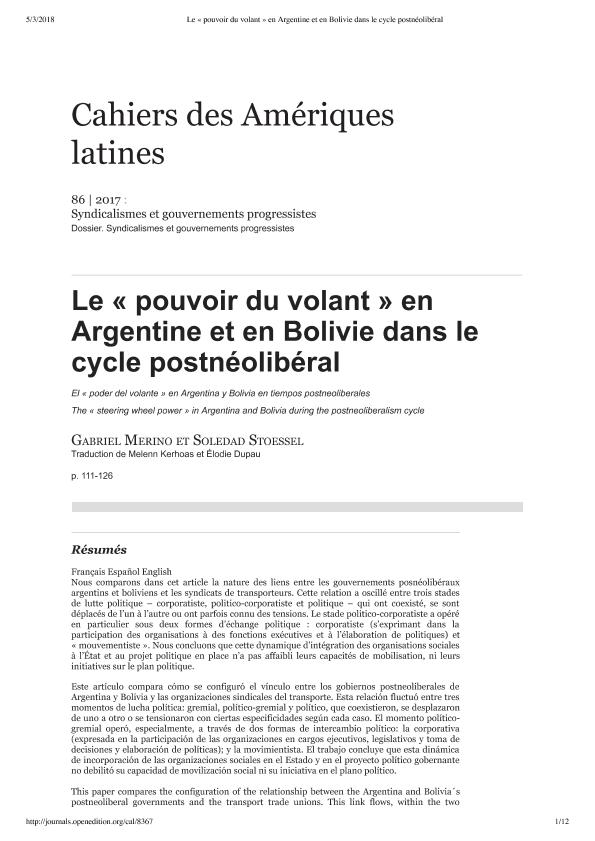Artículo
Este artículo compara cómo se configuró el vínculo entre los gobiernos postneoliberales de Argentina y Bolivia y las organizaciones sindicales del transporte. Esta relación fluctuó entre tres momentos de lucha política: gremial, político-gremial y político, que coexistieron, se desplazaron de uno a otro o se tensionaron con ciertas especificidades según cada caso. El momento político-gremial operó, especialmente, a través de dos formas de intercambio político: la corporativa (expresada en la participación de las organizaciones en cargos ejecutivos, legislativos y toma de decisiones y elaboración de políticas); y la movimientista. El trabajo concluye que esta dinámica de incorporación de las organizaciones sociales en el Estado y en el proyecto político gobernante no debilitó su capacidad de movilización social ni su iniciativa en el plano político. Nous comparons dans cet article la nature des liens entre les gouvernements posnéolibéraux argentins et boliviens et les syndicats de transporteurs. Cette relation a oscillé entre trois stades de lutte politique – corporatiste, politico-corporatiste et politique – qui ont coexisté, se sont déplacés de l’un à l’autre ou ont parfois connu des tensions. Le stade politico-corporatiste a opéré en particulier sous deux formes d’échange politique : corporatiste (s’exprimant dans la participation des organisations à des fonctions exécutives et à l’élaboration de politiques) et « mouvementiste ». Nous concluons que cette dynamique d’intégration des organisations sociales à l’État et au projet politique en place n’a pas affaibli leurs capacités de mobilisation, ni leurs initiatives sur le plan politique. This paper compares the configuration of the relationship between the Argentina and Bolivia´s postneoliberal governments and the transport trade unions. This link flows, within the two countries, through three moments of political struggle: the sectorial, the political-sectorial and the political one which co-existed, moved from one to another or were in constant tension with some specificities according to each country. The political-sectorial moments proceed, specially, through two ways of political interchange: the corporatist (expressed by the participation of labour organizations in executive and parliamentray positions and in the making of policies) and the “movement logic”. The article concludes that this way through which these social organizations were incorporated into the State and in the governmental political project did undermine neither their capacity of social mobilization nor their political initiative.
Le "pouvoir du volant" en Argentine et en Bolivie dans lecycle postnéolibéral
Título:
El "poder del volante" en Argentina y Bolivia en tiempos postneoliberales;
The "steering wheel power" in Argentina and Bolivia during the postneoliberalism cycle
The "steering wheel power" in Argentina and Bolivia during the postneoliberalism cycle
Fecha de publicación:
12/2017
Editorial:
Institut des Hautes Etudes de l'Amerique Latine
Revista:
Cahiers des Amériques Latines
ISSN:
1141-7161
Idioma:
Frances
Tipo de recurso:
Artículo publicado
Clasificación temática:
Resumen
Palabras clave:
NEGOTIATION
,
POLITICS
,
POSTNEOLIBERALISM
,
TRANSPORT LABOUR ORGANIZATIONS
Archivos asociados
Licencia
Identificadores
Colecciones
Articulos(IDIHCS)
Articulos de INST.DE INVEST.EN HUMANIDADES Y CS SOCIALES
Articulos de INST.DE INVEST.EN HUMANIDADES Y CS SOCIALES
Citación
Merino, Gabriel Esteban; Stoessel, Soledad; Le "pouvoir du volant" en Argentine et en Bolivie dans lecycle postnéolibéral; Institut des Hautes Etudes de l'Amerique Latine; Cahiers des Amériques Latines; 86; 12-2017; 111-122
Compartir
Altmétricas




